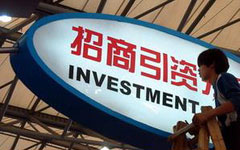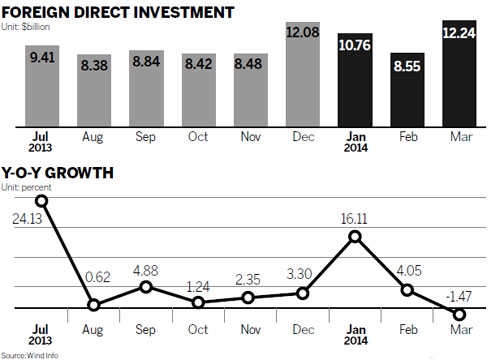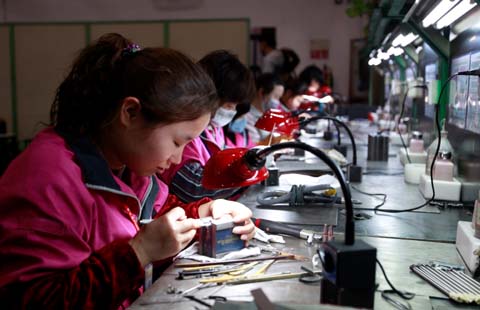March FDI in China falls 1.47% year-on-year
By Zheng Yangpeng (China Daily) Updated: 2014-04-18 07:21
|
Li Yi / China Daily |
Foreign direct investment in China fell in March, the first year-on-year contraction since January 2013, but officials and experts said monthly fluctuations do not reflect long-term trends.
According to the Ministry of Commerce's data on Thursday, FDI in China dipped 1.47 percent in March from a year earlier to $12.24 billion. The drop dragged FDI growth in the first quarter to 5.5 percent, amounting to $31.55 billion. By comparison, FDI grew 10.44 percent in the first two months.
|
 |
|
 |
A close look at the first-quarter FDI figures showed investment from major developed economies fell, while that from emerging economies held steady.
Investment from Japan plunged 47.2 percent to $1.21 billion in the quarter, while investment from the European Union slid 24.5 percent to $1.55 billion. Investment from the US was down 1.9 percent at $1.04 billion while that from members of the Association of Southeast Asian Nations rose 7.84 percent to $1.97 billion.
Commenting on the major contraction in EU FDI, Mei Xinyu, an expert at the Chinese Academy of International Trade and Economic Cooperation, a think tank under the Commerce Ministry, said European companies' confidence was undermined by a long-period of low growth. China's reduced appetite for luxury items may be another major reason for European companies to scale back their deployment in the market.
Rising uncertainty caused by tension between Japan and China, along with Japanese firms' weakening competitiveness in the global context, explained Japan's tumbling investment in China, said Mei.
- Looming IPO restart weighs on Chinese stocks
- Toyota to launch China-made Corolla, Levin hybrids in 2015
- Lenovo plans full listing in 2015
- Mercedes-Benz emerges as star of Auto China
- A new chapter in commitment
- China 'integral' for future growth
- Rate within reasonable range
- Officials, businesses seek to aid tea trade


















